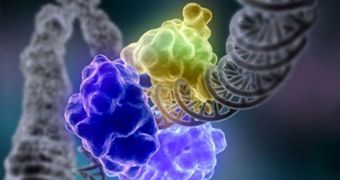A group of investigators from the Massachusetts Institute of Technology announce the discovery of a new approach to destroying cancer cells' ability to survive with massive damage in their DNA structure.
This trait is widely considered to be one of the fundamental things underlying the tremendous resistance that these cells demonstrate to whatever modern medicine can throw at them.
As such, one of the most important goals in medicine today is finding ways of suppressing that ability, thus making cancer cells more responsive to conventional chemotherapy. This could help save countless lives around the world, experts believe.
The MIT group released two new paper detailing their approach, which could make cisplatin and other chemotherapy drugs work more efficiently, and with fewer side-effects.
In their investigations, the scientists determined that turning down the function of a DNA damage defense system in cancer cells was very likely to prolong the lives of cancerous mice.
Additionally, it was discovered that all the relapsing tumors had a much smaller chance of being resistant to chemotherapy. The cancer cells were also less likely to spread elsewhere in the body.
MIT researchers Michael Hemann and Graham Walker, the senior authors of the two papers, say that two enzymes are the perfect candidates for breaching cancer cell defenses.
These molecules play a key role in regulating the way the diseased cells respond to DNA damage. Details of the enzymes were published on November 8 in the esteemed journal Proceedings of the National Academy of Sciences.
“What’s promising is that there are quite a few ways one could go about finding classes of compounds that would inhibit this activity,” explains Walker, who holds an appointment as an American Cancer Society Professor of Biology at MIT.
“If the tumor fails to respond to initial therapy, the likelihood of clinical success is very low upon repeated rounds of treatment,” adds Hemann, who is an assistant professor of biology at the Institute, and a member of the David H. Koch Institute for Integrative Cancer Research.
Developing methods of targeting the two enzymes directly would leave cancer cells without the defense mechanisms that allow them to ignore massive damage to their DNA. Under normal circumstances, such damage would kill any cell.

 14 DAY TRIAL //
14 DAY TRIAL //